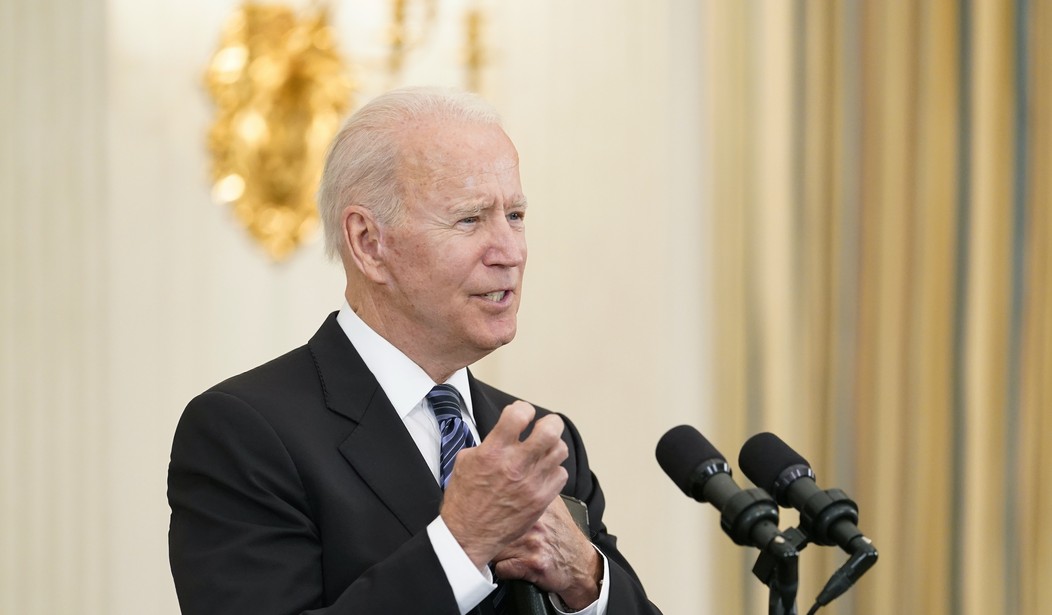On Thursday, President Biden and a bipartisan group of Senators announced a deal on infrastructure investments. Within hours, Biden embraced a bait-and-switch, and at least one of the framework's GOP supporters has jumped off the bandwagon as a result. What to make of it? Let's begin with the substance of the deal itself, which I think is actually pretty good. "Pretty good" as in, "what I'd like to see, ideally"? Of course not. But "pretty good, given the alternatives and the reality of Democratic control of the White House and both ends of Congress"? Yes. Some of the details:
Here’s the breakdown of the bipartisan infrastructure framework, per @JulieNBCNews. President Biden expected to speak on the specifics of the $1.2 trillion proposal next hour. pic.twitter.com/J1YH9KGuir
— Monica Alba (@albamonica) June 24, 2021
On the plus side: Only about half of this spending is new spending, with hundreds of billions repurposed from other previously-authorized spending. The projects outlined overwhelmingly appear to be targeted, real infrastructure, which is popular with the American people. This is not a "redefine anything and everything as infrastructure" misadventure. Though perhaps imperfect, there are pay-fors in this plan, including cracking down on unemployment benefits fraud. And the plan does not touch the 2017 Trump/GOP tax cuts, which helped spur a roaring pre-pandemic economy -- a red line for Republicans. On the negative side, it is still a staggeringly high price tag, and some of the pay-fors are at least partially dubious, or involve things like empowering a more muscular IRS to chase down delinquents. All said, not bad, in my view, especially under the circumstances.
But there's a catch. Some Republicans I've spoken with in recent weeks have expressed concerns about agreeing to a bipartisan deal, only to have Democrats shift all the other spending they want on hilariously broadly-defined "infrastructure" into a so-called reconciliation budget package, which only requires a simple majority for passage. Could they induce GOP buy-in for a reasonable package, then go it alone on an enormous second bill, getting everything they wanted after all, and touting it as "bipartisan"? It quickly became clear that this fear was very well-founded:
Recommended
Significant move for Pelosi —> She's promising that the House won't allow a vote on a bipartisan infrastructure bill until the Senate PASSES a reconciliation bill.
— Sahil Kapur (@sahilkapur) June 24, 2021
"There ain't gonna be no bipartisan bill unless we're going to have a reconciliation bill," she says.
! @JoeBiden says "if this (bipartisan deal) is the only thing that comes to me, I'm not signing it."
— Seung Min Kim (@seungminkim) June 24, 2021
And it at least appears as though Joe Manchin and Kyrsten Sinema are open to this one-two punch, likely suggesting that the votes are there for a very large, reconciliation-passed spending spree (Pelosi will almost certainly get the votes in the lower chamber). It may not be Bernie's $6 trillion blowout in the end, but it's going to be gigantic. Republican strategists and wonks instantly started sounding the alarm:
I ask quite seriously, if they are insisting on a reconciliation bill that will ultimately make this all a partisan affair, why even bother with the whole bipartisan escapade of the last month?
— Brendan Buck (@BrendanBuck) June 24, 2021
I cannot emphasize this enough: Republicans would be absolutely idiotic to agree to a infrastructure deal without an ironclad assurance that Democrats won't turn around & pass a reconciliation bill with the rest of the $trillions that the GOP just fought to remove from this deal.
— Brian Riedl ?? (@Brian_Riedl) June 24, 2021
Sure enough, Lindsey Graham -- one of 11 Republican Senators who negotiated and endorsed the compromise -- now says he's out (content warning for language):
Last night I caught up w/Lindsey Graham, one of 11 GOP supporters of the bipartisan infrastructure framework. What does he think of yesterday’s deal? He’s out. He said Biden has made Republican supporters of the framework look like “fucking idiots.” More: https://t.co/FidqJCsv2E pic.twitter.com/nVS6mTlfdL
— Ryan Lizza (@RyanLizza) June 25, 2021
"The president's comments did real damage here," a senior GOP aide told Politico, calling it "astonishing" that Biden endorsed the bipartisan framework "in one breath, and then announced he will hold it hostage in the next." But that's the play, evidently. Hugh Hewitt argues Biden immediately burned down the bridge he'd built. I spoke with a source familiar with the thinking of the pro-deal Republicans, and the aide advanced a pretty logical case for why it is still preferable to doing nothing: (1) It's decent on the merits, and that's part of governing. You control what you can control. (2) The Democrats were always going to do whatever they could with reconciliation, regardless, so why not pass an acceptable spending plan on a bipartisan basis, then let the other party fight it out on what makes it into the reconciliation package, having removed some of the major 'carrots' on popular infrastructure projects. (3) Hashing out and passing a cross-aisle bill on a consensus issue reduces the bite of "Republicans never negotiate" claims, repeatedly loudly and often by those who want a justification to kill the filibuster. Good faith discussions and results undermine that case.
These are fair points and I'm not sure they're wrong, on balance. On the other hand, one could easily argue that handing the Democrats a patina of bipartisanship as cover for their insane spending orgy is a mistake. Many voters will not differentiate between different pieces of the spending, and having GOP fingerprints on a major piece of a multi-trillion-dollar onslaught could make it harder for Republicans to message cleanly against the broader recklessness. Will holding down the price of the (real) infrastructure deal necessarily result in a lower overall price tag for the two bills combined? One might argue that Manchin and Sinema would wield more leverage to shave down a single giant all-or-nothing bill, for which their votes are essential. I see both sides on that one. And finally, will the memory of GOP cooperation on infrastructure in 2021 prevent a future, enlarged Senate Democratic majority from nuking the filibuster? It's possible, but I have my doubts. I'll leave you with this, which is irrefutably accurate:
Yep, those GA Senate losses cost trillions of dollars https://t.co/MZEi1vVlkh
— Rich Lowry (@RichLowry) June 25, 2021
Elections have consequences, and divided Republicans blowing it in Georgia is the reason why the current dynamics exist. One more Republican Senator, and it's a totally different ballgame.
























Join the conversation as a VIP Member